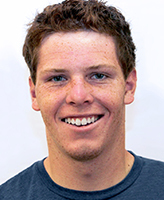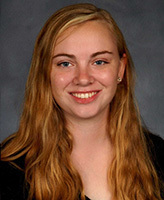 Civil Rights expert William Jones
Civil Rights expert William Jones
Notre Dame’s Department of History is a place where undergraduates aren’t just invited to attend lectures by world-renowned visiting scholars—they also get opportunities to converse one-on-one and even share meals with them.
Brian Plamondon, a sophomore history major in the College of Arts and Letters, recently dined with Norman Hammond, eminent Mayan history scholar and professor emeritus at Boston University. Senior history major Kim Dumais ate breakfast with civil rights expert and University of Wisconsin Professor William P. Jones. And Michael Meng, Assistant Professor of Modern German History at Clemson University, shared lunch with several history majors while on campus to receive the Nanovic Institute for European Studies’ Laura Shannon Prize for the best book in European history.
“In the Department of History, we envision undergraduates as part of our intellectual community,” says Daniel Graff, director of undergraduate studies for the department. “We think it’s important that we encourage visiting scholars to set aside time to interact with our majors, to discuss everything from shared research interests to the value of the humanities in our contemporary culture.
“These discussions, usually over a meal or coffee, often inspire students to consider a particular senior thesis topic or investigate an unfamiliar book, and they always enrich our students’ intellectual lives by showing them the importance of encountering new perspectives and engaging in casual conversation in the pursuit of knowledge.”
Talking History
 sophomore Brian Plamondon
sophomore Brian Plamondon
While some of the opportunities to engage with visiting scholars involve small groups of students, Plamondon actually went out to dinner as the only student with a handful of professors, including Hammond; Notre Dame’s Felipe Fernandez-Armesto, the William P. Reynolds Professor of History; Ángel Cortés, assistant professor of history at Holy Cross College; and Virginia Miller, associate professor in the School of Art and Art History at the University of Illinois at Chicago.
“It was fun just sitting back and listening to these four academics converse,” Plamondon recalls. “They talked freely about all kinds of things, from American movies in the 1920s to ancient civilization, so it was really interesting.”
Plamondon was not only impressed with Hammond’s personable nature and extensive knowledge of Mayan culture, but with how he integrates history, anthropology, and archaeology into his research. “He shared his personal experiences of being in the field for months at a time,” Plamondon says. “It was fascinating to get that firsthand knowledge because he’s been doing it for decades.”
One of the memorable stories Hammond told, Plamondon recalls, was about a dig where his team uncovered a structure but did yet not know what it was. “He says it started to rain and one day they put a tarp on top of it and one of the students said, ‘It’s like a sauna in here.’ And they realized it was an ancient Mayan sweat house, used for hunting rituals and birth rituals, and cool stuff like that.”
Gaining Perspective
 senior Kim Dumais
senior Kim Dumais
In November, to commemorate the 50th anniversary of Martin Luther King’s 1963 visit to Notre Dame, the department welcomed civil rights historian William P. Jones, author of The March on Washington: Jobs, Freedom, and the Forgotten History of Civil Rights (W.W. Norton, 2013). Jones delivered a public lecture, “The March on Washington and the Forgotten History of Civil Rights.”
Dumais was one of a small group of students who joined Jones for breakfast at Sorin’s prior to the lecture. “It was really awesome,” she says. “It’s great to be able to interact with professors outside of the classroom in a more casual setting.”
Having studied the Civil Rights movement in other classes, Dumais says she found Jones’ lecture particularly interesting. “It’s nice to hear another professor talk about what you already learned and get a new outlook on it.”
Dumais says she has gone to see a lot of speakers that the department has brought in. “I think it just gives you more perspectives on things,” she says. “There’s this really great one-semester class called Exploring History that I’ve taken a couple of times. We meet five times throughout the semester, we go to different lectures and events on campus, and we have a follow-up discussion after the lecture with a professor from the department.”
Thinking Differently
In October, the department welcomed Clemson University Associate Professor Michael Meng to deliver a lecture on his award-winning book, Why Do We Remember? On the Ambiguities of Cosmopolitan Memory in Contemporary Central Europe.
The department invites a number of different speakers each semester. Bringing in historians from a wide range of specialties gives students exposure to new topics and varied perspectives, sparking their curiosity and inspiring them to think differently, Graff says. And that, explains Dumais, is part of what makes the major so appealing.
“I like history because everything is questionable,” she says. “You read your history book in high school and get told that ‘that’s history’ and you get to come here and question everything. Why do people think those are the men and women who should be in your history book? Why are these the things we learned about? It’s fun to think about.”
Learn More >
- Department of History
- Dan Graff faculty page
- Nanovic Institute for European Studies
- Laura Shannon Prize
- Norman Hammond Boston faculty page
- William P. Jones Wisconsin faculty page
- Michael Meng Clemson faculty page
Originally published by at al.nd.edu on April 14, 2014.